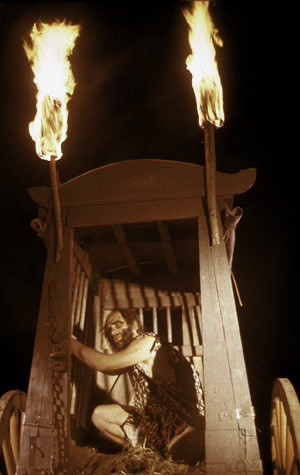
Bruno Lawrence
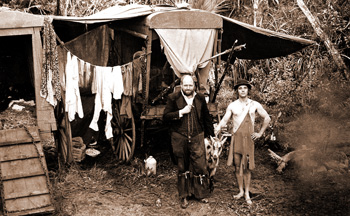
Ian Watkin & Bruno Lawrence
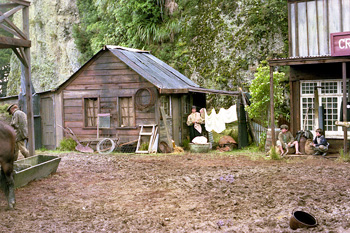
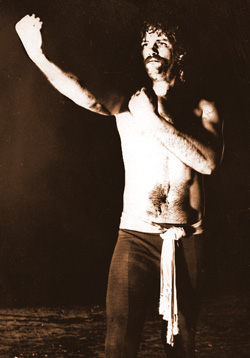
Bill Stalker
During the depression in the early 1930s three men joined a circus touring country towns in the lower half of the South Island. They had drifted together by force of circumstance. One of them said he could pull a "wild man" act so outrageous that it would disgust and convince the most sceptical onlooker. The other two believed him.
They dressed him in rags, dug a hole in the ground and covered it with a heavy grating stolen from a nearby waterworks. The primitive setting only made the act more convincing. The wild man was being treated like an animal.
The two men set up a rope enclosure. One took the money, the other made sure that no one got in free.
The wild man was so good he was revolting. He bit the heads off live chickens, he ripped raw meat apart with his bare hands, he stuffed it into his mouth, swallowing it, blood on his hands and running down his face.
People were fascinated. They poked sticks at him, threw stones down on him, yelled and abused him. They stamped on his hands when in his rage he leapt up and grabbed the grating. They forgot their own troubles for a while at the sight of his degradation.
The three men made money. The circus reluctantly took them on. People who came to see the wild man spent money on other acts too.
At Invercargill the circus broke up. The three men had put aside quite a lot of money, and on the last night the two of them above ground counted up the money. The wild man watched through the grating.
"Here's your share," said one, and threw down a raw hunk of meat. Laughing, they disappeared into the night, leaving the wild man to the mercy of the townspeople the next day.
"Twenty pounds," the posters promise, "if you can lick the Wild Man from Borneo ... but beware the evil eye!"
A fight is the climax of the film. It is set in a huge natural rock cavern on a beach 50 kilometres from the nearest town, Westport. Bill Stalker (from Close to Home) is Willy Masters, the town champion. He fights wild man Bruno Lawrence.
The decision to make a feature film in such an out-of-the-way place drew some criticism. It was suggested that it would be easier to build a pioneer town somewhere in the Hutt Valley.
"We're close friends with the West Coast community there, they'll help us out," said Murphy. "They have a multitude of dressings to help the period ... horses, harnesses, kegs, gigs, wagons, all that type of gear. Their lifestyle is not too unlike the pioneers - they use coal stoves and kerosene lamps, all of which can be shot as is.
"And they'll help us physically - they'll help us put the set up, shoot it, and people the scenes."
"In other words, you're going to rip them off," came an objection.
"No, not at all," replied Murphy. "There'll be more the $20,000 worth of commerce enacted there. We're taking down with us musicians, actors, entertainers, flying them over from Australia and from all over New Zealand, putting on film showings, giving concerts. It's virtually a barter deal.
"In fact, what'll happen to the community is, there'll be three weeks of highly social and, dare I use the word, cultural activity, culminating towards the end of shooting with Blerta playing, supplying free booze, food, and staging the wild man's last fight in a natural rock soundshell on the beach ...
"Can you put a price on that?"
The local people themselves were excited by the idea. They immediately started making suggestions - where to get horses, where to find props. Perhaps the biggest thing to catch their imaginations was the idea of live music on the Coast.
The facades of about 20 shops, houses and sheds were built on a paddock in front of a huge cliff. Some of the material was scavenged from wrecked buildings and from the dump at the sawmill where all the trims were dumped, with pieces of bark still on them. The rest was bought rough-sawn and untreated direct from the mill.
The locals made themselves indispensable in dressing the town. They came over and said, "The town needs this," and produced a rain barrel, ironmongery, blacksmith's tools. They had an eye for it, they didn't have to be asked.
It wasn't until Stalker arrived that he realised the working conditions were different to what he'd expected. Frequent rain had turned the streets of the town into an authentic, mud-churned highway.
But he quickly got the idea and was soon laying tracks for the camera crane and swigging large draughts of Westport Ale in shelter from the rain. He remembered that in a Blerta production he wasn't just there to act, there were a lot of other jobs to do.
A soggy blue sleeping bag was thrust at him. It was his first introduction to the accommodation plans. Stalker looked suspiciously at a crying child. He wondered about the sogginess of the bag.
He thought of the rather musty comfort of his separate dressing room and shower at Avalon, with carpet all the way down to the make-up room. Then he got back to work.
People started arriving from all over the Coast. Some walked or hitchhiked, some came on horseback; others took two days to get there. One of the crew drove to Christchurch to pick up Australian actor Tony Barry. They drove the 320 kilometres back through Arthur's Pass straight away - there was no time to spare.
Bruno refused to go down to see the cavern until the night of the fight. He wanted it to be new to him.
They dressed him in rags, dug a hole in the ground and covered it with a heavy grating stolen from a nearby waterworks. The primitive setting only made the act more convincing. The wild man was being treated like an animal.
The two men set up a rope enclosure. One took the money, the other made sure that no one got in free.
The wild man was so good he was revolting. He bit the heads off live chickens, he ripped raw meat apart with his bare hands, he stuffed it into his mouth, swallowing it, blood on his hands and running down his face.
People were fascinated. They poked sticks at him, threw stones down on him, yelled and abused him. They stamped on his hands when in his rage he leapt up and grabbed the grating. They forgot their own troubles for a while at the sight of his degradation.
The three men made money. The circus reluctantly took them on. People who came to see the wild man spent money on other acts too.
At Invercargill the circus broke up. The three men had put aside quite a lot of money, and on the last night the two of them above ground counted up the money. The wild man watched through the grating.
"Here's your share," said one, and threw down a raw hunk of meat. Laughing, they disappeared into the night, leaving the wild man to the mercy of the townspeople the next day.
* * * * *
That story was told to film director Geoff Murphy some 35 years later by one of the men who got away (the fate of the wild man is not known). Murphy saw in it the germ of a feature film and he, Ian Watkin, Martyn Sanderson and Bruno Lawrence set to work. They put it back to the turn of the century, left out the circus, and made it a tour of the rough mining towns on the West Coast. In every town the wild man fights the local champion, the toughest man in town."Twenty pounds," the posters promise, "if you can lick the Wild Man from Borneo ... but beware the evil eye!"
A fight is the climax of the film. It is set in a huge natural rock cavern on a beach 50 kilometres from the nearest town, Westport. Bill Stalker (from Close to Home) is Willy Masters, the town champion. He fights wild man Bruno Lawrence.
The decision to make a feature film in such an out-of-the-way place drew some criticism. It was suggested that it would be easier to build a pioneer town somewhere in the Hutt Valley.
"We're close friends with the West Coast community there, they'll help us out," said Murphy. "They have a multitude of dressings to help the period ... horses, harnesses, kegs, gigs, wagons, all that type of gear. Their lifestyle is not too unlike the pioneers - they use coal stoves and kerosene lamps, all of which can be shot as is.
"And they'll help us physically - they'll help us put the set up, shoot it, and people the scenes."
"In other words, you're going to rip them off," came an objection.
"No, not at all," replied Murphy. "There'll be more the $20,000 worth of commerce enacted there. We're taking down with us musicians, actors, entertainers, flying them over from Australia and from all over New Zealand, putting on film showings, giving concerts. It's virtually a barter deal.
"In fact, what'll happen to the community is, there'll be three weeks of highly social and, dare I use the word, cultural activity, culminating towards the end of shooting with Blerta playing, supplying free booze, food, and staging the wild man's last fight in a natural rock soundshell on the beach ...
"Can you put a price on that?"
The local people themselves were excited by the idea. They immediately started making suggestions - where to get horses, where to find props. Perhaps the biggest thing to catch their imaginations was the idea of live music on the Coast.
The facades of about 20 shops, houses and sheds were built on a paddock in front of a huge cliff. Some of the material was scavenged from wrecked buildings and from the dump at the sawmill where all the trims were dumped, with pieces of bark still on them. The rest was bought rough-sawn and untreated direct from the mill.
The locals made themselves indispensable in dressing the town. They came over and said, "The town needs this," and produced a rain barrel, ironmongery, blacksmith's tools. They had an eye for it, they didn't have to be asked.
It wasn't until Stalker arrived that he realised the working conditions were different to what he'd expected. Frequent rain had turned the streets of the town into an authentic, mud-churned highway.
But he quickly got the idea and was soon laying tracks for the camera crane and swigging large draughts of Westport Ale in shelter from the rain. He remembered that in a Blerta production he wasn't just there to act, there were a lot of other jobs to do.
A soggy blue sleeping bag was thrust at him. It was his first introduction to the accommodation plans. Stalker looked suspiciously at a crying child. He wondered about the sogginess of the bag.
He thought of the rather musty comfort of his separate dressing room and shower at Avalon, with carpet all the way down to the make-up room. Then he got back to work.
* * * * *
Only one night was available for filming the fight, and it had to be done in six hours. The tide runs right up inside the cavern; the site is free only during low tide.People started arriving from all over the Coast. Some walked or hitchhiked, some came on horseback; others took two days to get there. One of the crew drove to Christchurch to pick up Australian actor Tony Barry. They drove the 320 kilometres back through Arthur's Pass straight away - there was no time to spare.
Bruno refused to go down to see the cavern until the night of the fight. He wanted it to be new to him.
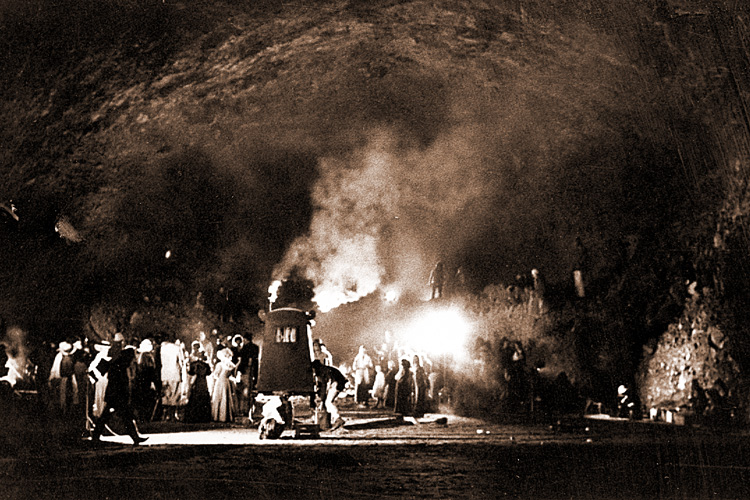
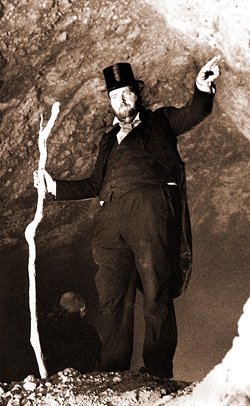
Ian Watkin
The only way to the site was through a rock tunnel carved out of the hill by the sea. He helped to haul one of the carts down it, then walked round the corner to see the huge, incredible arena. People were already in there, already bubbling, chatting, raving. It was a big party for them, dressed up in their best clothes, seeing friends from all corners of the Coast that they hadn't seen for a while. They stood around drinking Westport Ale and Vivante, a cheap apple cider from Nelson, and eating food prepared on the fires lit inside the cavern. It was a show and they were a part of it.
Lights picked out obscure shapes on the black rock face. The tide was going right out. Dogs were running up and down at the water's edge, barking excitedly.
Stalker arrived. He was amazed by the cave, amazed by the spectacle of this huge, glowing cave, the shadows on the wall jumping out at him. He stood watching, his eyes wide open, on his toes like a boxer. It looked to him like a prehistoric scene, like some Neanderthal fantasy.
He went over to Bruno and asked him if he wanted to work something out, to choreograph the fight. Bruno said, "I don't think we're going to able to, there's not much point really. The only choreography is, you're straight, a Queensberry rules boxer. I'm just a wild man, that's my act ... and it'll work out."
Stalker said, "Right, good, I'm glad."
Bruno thought, that's why Geoff's a good director, he knows we can handle it. He doesn't come over to give us last-minute instructions - we just have to fight and the cameraman has to cover it.
More people arrived, the crowd got noisier, energies were building up. The tar was heating up for the tarring and feathering of the Colonel. Torches blazed on each side of the wild man's cage.
"How long?" Murphy yelled to the cameraman. "Give us a time we can start."
"About 10 minutes," the cameraman shouted back.
Stalker wandered through the crowd. People talked to him as if he really were the town champ.
"You'll lick that wild man, Willy," they said. "He hasn't got a chance against you."
"Good on you, Willy ... go gettim, Willy," they shouted.
They were all sucked into the atmosphere, cut off from the outside world. They were in the middle of nowhere, the only reality the camera and the clapperboard.
People yelled in answer. They booed the wild man and cheered Willy Masters.
Lights picked out obscure shapes on the black rock face. The tide was going right out. Dogs were running up and down at the water's edge, barking excitedly.
Stalker arrived. He was amazed by the cave, amazed by the spectacle of this huge, glowing cave, the shadows on the wall jumping out at him. He stood watching, his eyes wide open, on his toes like a boxer. It looked to him like a prehistoric scene, like some Neanderthal fantasy.
He went over to Bruno and asked him if he wanted to work something out, to choreograph the fight. Bruno said, "I don't think we're going to able to, there's not much point really. The only choreography is, you're straight, a Queensberry rules boxer. I'm just a wild man, that's my act ... and it'll work out."
Stalker said, "Right, good, I'm glad."
Bruno thought, that's why Geoff's a good director, he knows we can handle it. He doesn't come over to give us last-minute instructions - we just have to fight and the cameraman has to cover it.
More people arrived, the crowd got noisier, energies were building up. The tar was heating up for the tarring and feathering of the Colonel. Torches blazed on each side of the wild man's cage.
"How long?" Murphy yelled to the cameraman. "Give us a time we can start."
"About 10 minutes," the cameraman shouted back.
Stalker wandered through the crowd. People talked to him as if he really were the town champ.
"You'll lick that wild man, Willy," they said. "He hasn't got a chance against you."
"Good on you, Willy ... go gettim, Willy," they shouted.
They were all sucked into the atmosphere, cut off from the outside world. They were in the middle of nowhere, the only reality the camera and the clapperboard.
* * * * *
Ian Watkin made his entrance as the Colonel to introduce the wild man. Excitement rose to fever pitch. "Ladies and gentlemen, I bring you the fight of the decade!"People yelled in answer. They booed the wild man and cheered Willy Masters.
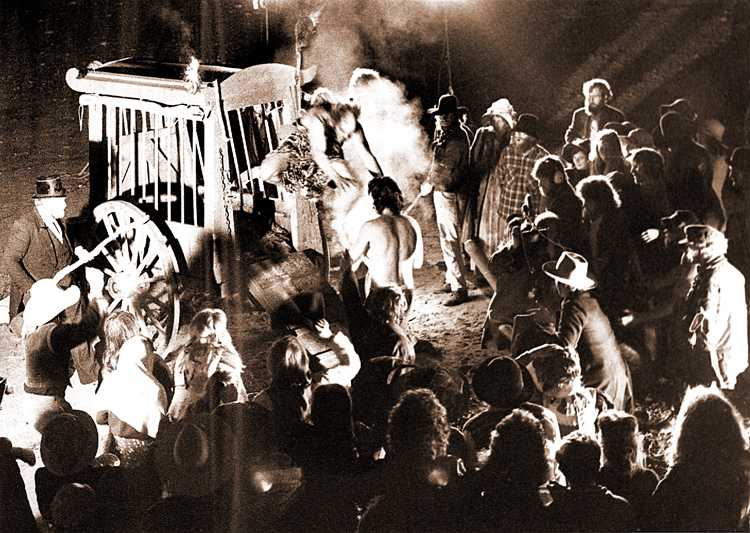
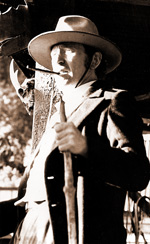
Tony Barry
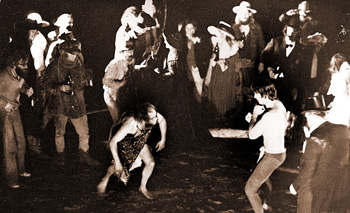
Bruno's first leap was premature. As he started to leap out at Stalker the cameraman shouted, "Hold it, cut!"
Bruno grabbed the edge of the cage and fell back inside. He heard the crowd's roar change as he did so. ... "Oooooooh ... ahhhhhh" ... then chanting, "Go gettim Willy! Go gettim Willy!"
As the fighters clashed, the crowd suddenly went quiet. Then they broke out into a deafening roar. A few became wild men themselves as they looked down on the sweating, shining bodies grappling on the sand.
Performance and reality merged. Stalker felt Bruno's teeth bite into the back of his neck and he knew it was for real. He scurried to get out of Bruno's way, squirming, kicking, scrambling, clawing. He wondered why this man kept crying "Cut!"
Bruno knew it was the end of the shot only when the cameraman tapped him on the shoulder. Even then he wasn't sure, because the crowd was pushing and shoving him, egging him on.
The crowd kept up their yelling even while the next shot was being discussed. Tony Barry, the complete fight promoter by now, came over. "That was good, that was brilliant, you've got the crowd really excited."
Bruno knew that this was a part of the movie they really had to sell. He went right into it, put all his energy into it, almost mindless in a way. But he always knew where they were at, what the next stage was, where the cameras were. One of his bushy eyebrows fell off and he shoved it into a corner of the cave and forgot it.
Stalker was also caught up in the conflict of remembering through the drunken haze and bizarreness of it all that there was a job in hand, a film to be made. Who was on top of whom for the start of the next shot? He shook his head, trying to glimpse what was needed for Murphy to work it into sequence.
Then the tide started to come in. It pushed them farther and farther into the cave. The size of the shots was reduced to suit the amount of sand left, until they were right up inside the cave, shooting in the remaining available light with the sea beating on their heels.
It was four in the morning. The locals were drifting away. The crew and the actors were grabbing gear and taking it up to the road. There was a smell of salt spray in the air.
Stalker was exhausted. He was thirsty, tired, wet, scratched, sandblasted. But he'd enjoyed it. He was miserable only in the way he was miserable climbing mountains, or sitting in the middle of lakes at dawn while duck shooting.
Bruno was stiff and sore. He'd been scraped against sand and knocked against rocks. But he was thrilled because it had worked like mad, it had been a real event. He felt something magic had been captured on film.
And it was the friendliest fight he had ever been in.
New Zealand Listener, 28 May 1977
[An excerpt from the film can be seen here.]
Bruno grabbed the edge of the cage and fell back inside. He heard the crowd's roar change as he did so. ... "Oooooooh ... ahhhhhh" ... then chanting, "Go gettim Willy! Go gettim Willy!"
As the fighters clashed, the crowd suddenly went quiet. Then they broke out into a deafening roar. A few became wild men themselves as they looked down on the sweating, shining bodies grappling on the sand.
Performance and reality merged. Stalker felt Bruno's teeth bite into the back of his neck and he knew it was for real. He scurried to get out of Bruno's way, squirming, kicking, scrambling, clawing. He wondered why this man kept crying "Cut!"
Bruno knew it was the end of the shot only when the cameraman tapped him on the shoulder. Even then he wasn't sure, because the crowd was pushing and shoving him, egging him on.
The crowd kept up their yelling even while the next shot was being discussed. Tony Barry, the complete fight promoter by now, came over. "That was good, that was brilliant, you've got the crowd really excited."
Bruno knew that this was a part of the movie they really had to sell. He went right into it, put all his energy into it, almost mindless in a way. But he always knew where they were at, what the next stage was, where the cameras were. One of his bushy eyebrows fell off and he shoved it into a corner of the cave and forgot it.
Stalker was also caught up in the conflict of remembering through the drunken haze and bizarreness of it all that there was a job in hand, a film to be made. Who was on top of whom for the start of the next shot? He shook his head, trying to glimpse what was needed for Murphy to work it into sequence.
Then the tide started to come in. It pushed them farther and farther into the cave. The size of the shots was reduced to suit the amount of sand left, until they were right up inside the cave, shooting in the remaining available light with the sea beating on their heels.
It was four in the morning. The locals were drifting away. The crew and the actors were grabbing gear and taking it up to the road. There was a smell of salt spray in the air.
Stalker was exhausted. He was thirsty, tired, wet, scratched, sandblasted. But he'd enjoyed it. He was miserable only in the way he was miserable climbing mountains, or sitting in the middle of lakes at dawn while duck shooting.
Bruno was stiff and sore. He'd been scraped against sand and knocked against rocks. But he was thrilled because it had worked like mad, it had been a real event. He felt something magic had been captured on film.
And it was the friendliest fight he had ever been in.
New Zealand Listener, 28 May 1977
[An excerpt from the film can be seen here.]








